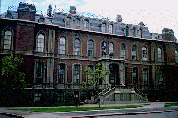 School
of Information
School
of Information
Previously School of Library & Information Studies
Michael Buckland,
Emeritus Professor.
On Education
*New* - Om
Utdanning. Norwegian translation by Tvangssalg bolig, Dec 2021.
*New* - Об образовании.
Russian translation by Wowessays, May 2021.
- "What kind of science can Information Science be?"
Journal of the American Society for Information Science and Technology vol 63, no 1
(2012): pp 1-7.
Preprint [pdf].
- Opening remarks: Advice on
doctoral research. NORSLIS
Course on Public Libraries in the Nordic Welfare States, Uppsala,
Sept 29 - Oct 3, 2008. ppt.
- Northern Light: Fresh
Insights into Enduring Concerns.
In: Skare, Roswitha, Niels Windfeld Lund, and Andreas Våerheim, eds.
A Document (Re)turn. Contributions from a Research Field in
Transition. Frankfurt a.M.: Peter Lang, forthcoming in 2007.
"The usual approach when developing new programs in this field has been
to combine the notoriously ill-defined notion of information with an
invocation of interdisciplinarity. This process leads to an incoherent
collage. The result may contain interesting elements, but the lack of
coherence inhibits rational planning and makes the program hard to
explain to outsiders. The Tromso Dokvit program, like Briet's, was
wiser: the notion of a document was taken as the central defining
concept and was understood to include any signifying thing.
Documentation was seen as both the process of documenting and also
the outcome of that process. So Documentation Studies ("Dokvit")
includes the systematic examination of all aspects of document and
documentation. This clear and practical formulation has conceptual
and practical advantages and may be considered in three dimensions:
meaning, technology, and economics."
-
Information schools: A Monk, Library Science,
and the Information Age. The rationale for evolving and modernizing
academic programs in library science seen in the context of German library
science: Martin Schrettinger, Adolf von Harnack, Fritz Milkau, and Humboldt
University.
Manuscript for Humboldt University Institute of Library Science
students' book project. July 24, 2004.
-
Technology and the Information School.
November 2001.
-
Three Kinds of Information Systems Programs.
November 2001. Three types are distinguished: Computer Science programs
concerned with algorithms; Business school programs concerned with
corporate information technology; and Information Schools concerned
with what people want, need, or have a right to know. There are
significant differences with respect to selecting, interdisciplinarity,
and how they are anchored.
-
The
The
Academic Heritage of Library and
Information Science: Resources and Opportunities.
ALISE Conference, Jan 12, 2000. Academic Heritage of Library and
Information Science: Resources and Opportunities.
ALISE Conference, Jan 12, 2000.
Schools of Library and Information Studies, of
Information Management, of Information Anything, are
concerned with
the creation, distribution, and utilization of knowledge.
These schools
have inherited multiple traditions.
We are concerned with: 1. Documents: Anything that is regarded as signifying;
2. Ideas;
3. Problems of great social significance;
4. Complexity: Human understanding and
belief, information technology, and social policies.
5. Technology: New technologies change what is feasible.
6. Education: Who are we to educate?
We should build expansively on a heritage broadly concerned with documents, knowledge,
ideas, tackling major social
problems of great complexity, changing technology, and an open-ended
educational mission.
-
The "Liberal Arts" of Library and Information
Science and the Research
University Environment. Summary.
In the USA a "liberal arts" education is focussed on the subject matter itself, in contrast to
"professional" or technical education which focused on
acquiring useful skills.
A "liberal arts" approach could have some significant
intellectual and political advantages for LIS schools in research
universities. Professional LIS education should be
situated within the framework of a liberal arts conception of LIS.
Published in Second International Conference on
Conceptions of Library and Information Science: Integration in Perspective,
1996. Proceedings. Ed: P. Ingwersen, N. O. Pors.
Copenhagen: Royal School of Librarianship, 1996, pp. 75-84.
-
Robert Gitler and the Founding of the Japan Library
School, at Keio University, Tokyo, 1951.
- *New* For more on Robert Gitler and the Japan Library School, see
see Ideology and
libraries: California, Diplomacy and Occupied Japan, 1945-1952 by M.
Buckland with Masaya Takayama (Rowman & Littlefield, 2020) available from https://rowman.com/ISBN/9781538143148. For 30% discount try code RLFANDF30.
- Library Education: a Centenary and the Future, (1987).
- Guides to online Library Science and Master
of Library and Information Science degrees.
Go to
Michael Buckland's
home-page.
 School
of Information
School
of Information